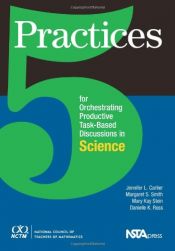5 Practices for Orchestrating Task-Based Discussions in Science
Blurb
Robust and effective classroom discussions are essential for providing students with opportunities to simultaneously engage in science practices while learning key science content. Using numerous examples and science learning tasks, the authors show how teachers can plan the lesson to encourage students to not only learn science content but employ disciplinary practices as well. This volume outlines the five practices teachers need for facilitating effective inquiry-oriented classrooms:Anticipate what students will do what strategies they will use in solving a problem Monitor their work as they approach the problem in class Select students whose strategies are worth discussing in class Sequence those students presentations to maximize their potential to increase students learning Connect the strategies and ideas in a way that helps students understand the science learned
The 5 Practices framework identifies a set of instructional practices that will help teachers achieve high-demand learning objectives by using student work as the launching point for discussions in which important scientific ideas are brought to the surface, contradictions are exposed, and understandings are developed or consolidated.
About the Authors:
Jennifer Cartier is the director of teacher education and a member of the science education faculty at the University of Pittsburgh. Her work focuses on the design and facilitation of learning contexts for pre-service and early career teachers.
Margaret Smith holds a joint appointment at the University of Pittsburgh as professor of mathematics education in the School of Education and as Senior Scientist at the Learning Research and Development Center. Her research focuses on what teachers learn from the professional education experiences in which they engage.
Mary Kay Stein holds a joint appointment at the University of Pittsburgh as professor of learning sciences and policy and as Senior Scientist at the Learning Research and Development Center. Her research focuses on mathematics teaching and learning in classrooms and the ways in which policy and organizational conditions shape teachers practice.
Danielle K. Ross is a teaching fellow and doctoral candidate in science education at the School of Education of the University of Pittsburgh. Her work focuses on teacher learning and the design of learning contexts for beginning teachers. She was previously a biology and ecology teacher at Leechburg Area School District in Leechburg, Pennsylvania.
Reviews and Endorsements for 5 Practices for Orchestrating Productive Task-Based Discussions in Science:
One of my biggest challenges as a science teacher is how to both engage students in the practices from the Next Generation Science Standards and teach the content from my curriculum. Before, I sometimes felt that I had to choose between the two. However, 5 Practices provides clear examples and very concrete guidelines for how to orchestrate student-centered discussions that also support sense making. Now my students and I can experience the excitement of argumentation while still staying true to our curriculum. This is my new bible for facilitating student discourse! Austin Deaver, Science Teacher, Montgomery Village Middle School Montgomery Village, Maryland
Planning for and engaging students in meaningful scientific reasoning and adapting instruction in response are simultaneously the most difficult and the most important tasks science teachers face. This book provides both new and experienced teachers with a road map to continually improve their ability to do this work. Nicole M. Gillespie, Executive Director, Knowles Science Teaching Foundation Moorestown, New Jersey.

 English
English Español
Español Deutsch
Deutsch
Member Reviews Write your own review
Be the first person to review
Log in to comment